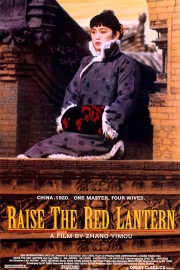Raise the Red Lantern
“Raise the Red Lantern” is a staggeringly beautiful film, as well as a painfully tragic one. The film begins with the main character, Songlian, telling her mother that her dream is to marry a rich man. Her mother tells her that her life would then be that of a mistress and concubine. And so, her journey begins, as she walks to her new husband’s house, because she did not know the protocol. As she gets familiarized with the life, however, she finds marrying a wealthy man is not what she thought it would be.
Songlian is played by Gong Li, director Zhang Yimou’s muse in the early stages of his career, and it is a role that has a natural progression as the young woman learns the ins and outs of life as one of four brides, at first demanding respect, then trying to earn it through manipulation, finally breaking to a point where one choice by her sets off a chain reaction in the house that drives her mad. As the seasons change, so to do the fortunes of Songlian, leading to a truly haunting third act as her actions have dire consequences.
For much of the film, Yimou and screenwriter Ni Zhen (adapting the novel by Su Tong) look to be making a film about sexual politics between five women, all of whom have affection for Chen Zuoqian (Jingwu Ma), the master of the household. The one who seems most adept in manipulating Chen is Meishan (Saifei He), the third wife, a singer, whom feels most threatened by Songlian coming into the household; on their wedding night, Meishan feigns sickness, forcing Chen to abandon his best with Songlian, and spend the night with her. The one who appears most friendly is Zhuoyan (Cuifen Cao), the second wife, whom tries to help Songlian navigate the household, but also, desperately, wants to give Chen a son. The first, and oldest wife, is Yuru (Shuyuan Jin), and she is familiar with the game being played, and too old to play it; she has settled into the life, with a healthy son (Feipu, played by Xiao Chu) to show for it. There is a fifth woman tangled up in this web, however, and it is Yan’er (Kong Lin), Songlian’s servant, whom is in love with Chen, and jealous to be serving his latest wife. The scenes between the women, as we get to understand the way the household is run, are fascinating to watch, as we see, largely from Songlian’s perspective, how the women pit themselves against one another, and how Songlian, whom went to university for six months before her father died, forcing her into marriage, is trying to figure out how to live within those rules while creating her own. It’s that back-and-forth that makes the drama of “Raise the Red Lantern” so compelling, and the ending so heartbreaking.
Yimou is a storyteller whom shows tremendous compassion to women in his films, and identifies with them, arguably more than with men. His early work with Gong Li reflects that, and this was their finest collaboration. This is a rich, fully-developed study of a character going through the seasons, and stresses, of a way of life, and coming through the other side changed. That we feel such empathy for her, as she is walking, alone, in the courtyard, after what she has witnessed, is an image as impactful as any put on screen. The why comes down to the masterful cinematography by Lun Yang and Fei Zhao, whose use of color and shot composition creates an sensual, anxious landscape for these characters to work in, whether it’s in their bedrooms, at the dinner table, or on the roof, looking on at what is happening in the distance. Li’s performance is why we care so much; Yimou’s storytelling gives her room for boundless amounts of empathy in this complicated, emotional melodrama.










